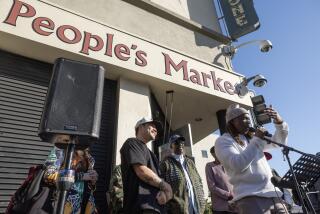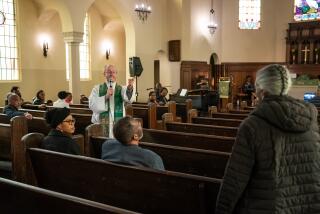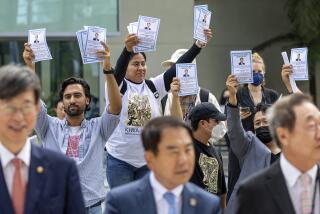Blacks Seek to Channel Anger Over Sentence
- Share via
African-American leaders sought Saturday to channel anger over the light sentence given a Korean-born grocer convicted of killing a black teen-ager into a campaign to increase black political and economic strength in the community.
More than 300 activists filled the pews of Bethel African Methodist Episcopal Church in South Los Angeles, where the emphasis was not only on improving relations between blacks and Korean-Americans, but on blacks exerting more control of their neighborhoods.
During the four-hour town meeting--punctuated by standing ovations, raised fists and shouts of “Amen”--a number of the city’s African-American leaders said the best response to the sentence is to elect more representatives, develop more businesses and devote more resources to social action.
“If not you, who? If not now, when?” implored the Rev. Edgar E. Boyd, pastor of the church. “Let’s stop the talk and let’s get up and get on and get into it.”
Brotherhood Crusade President Danny Bakewell told the gathering that he is seeking the support of 30 community groups willing to devote their resources one day a month to inflict “economic paralysis” on any merchant who deals with blacks in bad faith.
Like others at the meeting, Bakewell was scornful of Superior Court Judge Joyce A. Karlin, who on Friday placed grocer Soon Ja Du on five years’ probation for the fatal shooting of 15-year-old Latasha Harlins. Du also received a $500 fine and was ordered to perform 400 hours of community service.
Bakewell said he plans to lead a protest in front of Karlin’s home.
“We’re going to disrupt her life like she disrupted the Harlins’ life,” said Bakewell, conceding that he does not know her address. “We’re not advocating violence, but I know that she and her neighbors will consider it a major disruption of their lives if black folks are standing out there 24 hours a day.”
Harlins’ family, who sat behind the pulpit in the chairs usually reserved for the choir, said they would support Bakewell’s efforts.
“By whatever means necessary,” said Denise Harlins, the slain girl’s aunt.
The gathering, sponsored by the Black Women’s Forum and led by Rep. Maxine Waters (D-Los Angeles), had been scheduled weeks ago to discuss “Violence in the Black Community.” But, in an unexpected twist, it came the day after Du’s sentencing.
The March 16 shooting at the Empire Liquor Market near 91st and Figueroa streets took place when Du accused Harlins of stealing a $1.79 bottle of orange juice. The girl, who according to witnesses had money for the juice in her hand, denied trying to steal it. In the ensuing scuffle, captured on the store’s security camera, Du fired a single shot at Harlins after the teen-ager put down the juice and was walking away.
The shooting of Harlins underscored the sometimes strained relationship between Korean merchants and residents of the mostly black communities where they do business. Blacks have complained that the shopkeepers treat them with disrespect, while the merchants say they must guard against the risks of doing business in some of the city’s poorest neighborhoods.
While a truce between the two communities had been struck in recent weeks, few leaders expected that Du--facing a maximum sentence of 16 years for voluntary manslaughter--would serve no jail time.
At another previously scheduled meeting of 100 minority leaders across town, entitled “Communities in Crisis: Poverty, Racism and Urban Violence in Los Angeles,” Korean-American leaders expressed concern that the sudden outpouring of emotion might endanger the fragile accord.
“As a Korean-American, I am afraid when people say they are going to take this to the streets,” said Marcia Choo, director of the Asian Pacific American Dispute Resolution Center. “All it takes is just one person to break down everything we’ve worked for.”
Jerry Yu, president of the Korean American Coalition, said: “Now there is a perception that the Koreans got away with something in the black community and that something must be done about it.”
Deputy Mayor Mark D. Fabiani, who did not attend either of the meetings, said city officials have been in contact with leaders of both communities and remain hopeful that the truce--which includes an employment program for blacks and an end to a boycott of a South Los Angeles liquor store--will hold.
“People have a right to protest the judge’s decision and the mayor would be the last person to tell people to not exercise that right,” Fabiani said. “But people’s anger has to be channeled toward a productive solution.”
The Rev. Cecil L. (Chip) Murray, pastor of First A.M.E. Church, said he will encourage residents to express their frustration in protests, but also to build coalitions.
“In the short run, we must vent our anger to the larger community . . . or else we will be taken for granted,” Murray said. “We must feel that our lives have value. We must feel that justice is equitable, that Latasha’s death has meaning.”
But he cautioned that a “thoughtless word or deed could easily trigger polarization” and called on blacks to “be offended without being offensive and to be offensive without being violent.”
At the town meeting at Bethel A.M.E., the anger was readily apparent. One man was wearing a hand-lettered T-shirt that said: “(Expletive) the judge. Justice B Damned!!!” Wilbur Thomas, wearing a Malcolm X cap, stood in the street waving a sign that read, “Enough is enough.”
“I wanted it to say: ‘Take it to the streets,’ but I didn’t want to be arrested for inciting a riot,” Thomas said. “This is the closest I could come to saying that we should be doing something drastic.”
Most leaders at the meeting tried to harness those emotions into a call for black empowerment.
In a rousing speech, Archbishop George A. Stallings Jr., the African-American priest who was excommunicated from the Roman Catholic Church for forming a breakaway movement in 1989, hoped that Harlins’ death would raise the consciousness of the black community.
“It is time for us . . . to wake up and smell the coffee,” said Stallings, as the crowd rose to its feet, clapping. “It is time to wake up Los Angeles and take destiny into our own hands.”
More to Read
Sign up for Essential California
The most important California stories and recommendations in your inbox every morning.
You may occasionally receive promotional content from the Los Angeles Times.










